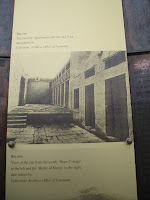 |
| Two years later we stand next to our three roomed house |
DWELLING
at the
BURNIE MART
The FARMERS' CO-OPERATIVE AUCTIONEERS LTD. will offer at their Burnie Mart, on FRIDAY, APRIL 20, at 3 o'clock,
A delightfully situated 3-roomed concrete dwelling, situate at No. 14 Mark street, Hillcrest, Burnie.
3-plate electric stove installed.
This dwelling would serve as a temporary abode while larger premises were being installed on the spacious block of land, which overlooks Bass Strait and central Burnie.
For further particulars and to arrange inspection,
The FARMERS' CO-OPERATIVE
AUCTIONEERS LTD.,
FRIDAY, APRIL 20.1951
A three roomed house might not sound very exciting to many people but my parents braved Mark Street and purchased this house, moving in about six weeks later. They had been living with my grandparents, where my sister and I each had a drawer as a bed. This was alright for me as I was only a few months old but at nearly two, she would have had to tuck her knees under her chin.
Within a couple of weeks of the purchase, it was reported that road works had to cease as rain had made the thoroughfare into a quagmire and three cars were bogged so deep there was no hope of towing them out till the road dried out. That would have made Mum really happy.
Our house was made of grey brick and the stove really was its only selling point. Three rooms end to end was all there was - not even a kitchen sink. The four of us slept in one room which also housed a wardrobe and dressing table. A Peter's oven was removed to make way for a fireplace in the lounge which was also the dining room and kitchen. Somehow, this oven was transported to Lower Wilmot where it was welcomed in the Doe household. The final room of our house was the bathroom/laundry/front entrance. Not many houses have only one door which opens straight into the bathroom.
I still remember the green lino on the floor and the red painted rectangle of tin over the fireplace. Lace curtains and holland blinds covered the windows and dampness had caused the formation of huge bubbles in the layers of plywood on the internal walls. We sat at the homemade table on a wooden bench and the parents each had a bent wood chair.
There is a view of Bass Strait, as the advertisement says, but a couple of hills would need to be flattened to really get a view of central Burnie














